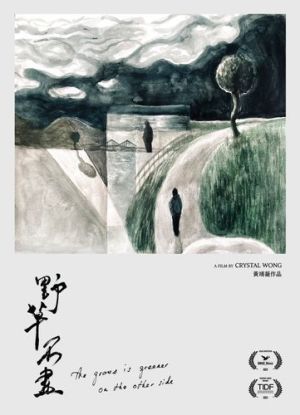Two people, both so different yet similar, struggle to make sense of the future in Crystal Wong’s low-key documentary.
“I’m not Chinese. I’m a Hong Konger.”
It’s something of an understatement to say that Hong Kong has been through a lot lately. The 2014 Umbrella Movement, the highly controversial extradition bill, the 2019 protests and – just to wash all that down with – a pandemic. With all that’s happened, its’ natural to wonder just what lies in store in the country’s future. After all, the violence has died down, but the looming threat of the CCP hangs ominously over a country whose politicians seem powerless to do anything.
It’s these thoughts that fill the heads of The Grass is Greener on the Other Side’s two protagonists. Fai and Tiga are two young men living in this new Hong Kong, and whose futures are as murky as the country’s. Both decide to leave Hong Kong for the United Kingdom; Tiga by himself and Fai with his wife and newborn child in tow. As they abandon their lives for something somewhere else, their identities as Hong Kongers are put to question.
What does it mean to be a Hong Konger now they live in another country, and does it change the way others see the? Those are the questions that Crystal Wong brings up in her gentle documentary. Not only does the movie highlight the issues that locals face in their own country, but the ones they face abroad, when they are constantly mistaken for mainland Chinese, evidenced by the people who insist on greeting them with a ni-hao.
While it first might seem a bit aimless, leaning too much on fly-on-the-wall unfocused storytelling, Wong actually has a lot to say about the country and the people who have left it to find greener pastures. Mostly hidden through careful selection of conversations, her point of view is made clear as the film progresses, and the movie’s destination becomes clearer the more time you spend with its two leads.
Wong keeps everything low-key, sticking to only two stories, but manages to say plenty with both of them. In both Fai and Tiga, we see reflected many different individuals. Despite having gone through similar experiences, both men have an ultimately different way of seeing the world, and that drastically changes how they see Hong Kong as a concept. Tiga is young, and even when he learns one of his friends has been arrested, is hopeful to be back in the city with them all before long. Fai, on the other hand, has abandoned Hong Kong, stating that in order to leave a place you have to really despise it. He still fights, but in his own way, against China instead of for Hong Kong.
After some pretty hard-hitting films like If We Burn and Revolution of our Times, there’s something refreshing about seeing something a touch calmer and more reflective. If those two previous movies were responses and reactions to events as they were unfolding, Grass feels more like a pensive, reflective epilogue.
Except perhaps the term “epilogue” is unwisely used here. Wong puts the events of the protests firmly within the context of the stories shown, but it never feels like an ending. It’s not a full stop to the events, it’s a comma – a prologue to a whole other story that is yet to take place. She understands that there can be no new beginnings without endings coming first: the stories of the protestors is winding down, but that of the younger generation who will grow up in a world defined by those protestors is only just beginning.
Verdict: Unassuming but surprisingly effective, The Grass is Greener on the Other Side might not be gut-wrenching as other documentaries on Hong Kong, but it has plenty to say, and does so with restrained, streamlined confidence.
Overall entertainment: 8/10
The Grass is Greener on the Other Side (2021)
Cantonese
Director: Crystal Wong


